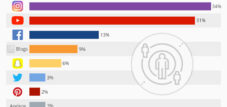Brand communication: What B2B can learn from B2C brand communication – new strategy with and for SME industry influencers
Language selection 📢
Published on: May 16, 2024 / update from: May 16, 2024 - Author: Konrad Wolfenstein
🤝 Customer engagement and industrial influencer: new ways for SMEs - learning from B2C - new strategies for B2B brand communication
🚀 attract attention in a saturated world: success strategies for companies
🤝 In today's fast -moving world, consumers' attention has become a difficult currency. In view of a constantly growing market and intensive competition, companies of all sizes and industries are faced with the challenge of developing effective brand communication strategies. This applies not only to the B2C area, which is traditionally geared towards direct consumer contact, but also to B2B companies. In fact, B2B companies can learn important lessons from B2C brand communication, especially with regard to emotions, storytelling and customer engagement. Furthermore, the integration of industrial influencers can represent an effective strategy for SMEs in order not only at national, but also at an international level.
🌟 The importance of emotions in B2C communication
📘 emotions play a central role in B2C communication. Brands that manage to establish an emotional connection to their consumers can permanently anchor themselves in their memory. Decisions are often made on the basis of feelings and not on the basis of rational considerations. B2B companies can benefit from this knowledge by adapting their communication strategies and involving emotional elements. Instead of concentrating only on technical details and product features, you should tell stories that find the emotional response and address your target groups on a more personal level.
📚 storytelling as a powerful tool
📖 storytelling is an art that is widespread in the B2C area. Successful brands often act as storytellers who surround their products or services with a convincing story. These stories are not only entertaining, but also convey values and beliefs of the brand. For B2B companies, storytelling offers the opportunity to communicate complex content in an understandable and appealing manner. By embeding their offers into a larger narrative, B2B brands can make importance and stand out.
🌱 maintain customer engagement
🔗 The structure of long-term relationships is just as important in the B2B segment as in the B2C area. Customer engagement does not arise overnight. It requires continuous effort and the provision of added value. B2C companies often use social media to get in touch with their consumers, collect feedback and a community to form their brand. B2B companies can apply similar strategies to promote the commitment of their business customers. Interactive platforms, customer events or exclusive content can help build a permanent relationship and to expand the customer base.
🔍 The influence of an industrial influencer and for SMEs
🚀 The industrial influencer is increasingly establishing itself as a valuable resource in B2B brand communication, especially for SMEs. These people have a profound understanding of their industry and a significant range within their community. Through cooperation with these influencers, SMEs can strengthen their credibility, reach their target groups more effectively and communicate their messages with an authentic voice. In addition, cooperation with influencers gives access to international markets, as many of them have a global supporter. This strategy can be cost -effective, especially for SMEs, as they have to spend fewer resources for traditional marketing channels.
💡 B2B and B2C communication
🎯 The boundaries between B2B and B2C communication are increasingly blurred. Emotional addressing, storytelling and active customer engagement, traditionally strengths of the B2C area, also prove to be extremely effective in the B2B environment. In addition, industrial influencers KMUS offer the opportunity to increase their visibility and credibility and also grow at an international level. In order to be successful in today's competitive landscape, B2B companies must therefore think beyond the traditional framework and develop innovative brand communication strategies that address both rational and emotional aspects. Ultimately, it is about creating real connections that go beyond mere business transactions and forge sustainable relationships both in the home and in the global brand community.
📣 Similar topics
- 🎭 How emotions revolutionize B2C and B2B communication
- 📖 storytelling: the secret weapon in marketing
- 🤝 Customer engagement: key to long -term success
- 💡 Industrial influencer: a new horizon for SMEs
- 🌍 cross -border brand formation with the help of influencers
- ❤️ Emotional address: The unbeatable advantage in B2B marketing
- Learn from B2C: Innovation paths for B2B brands
- 🔍 Why sell stories: a profound look at storytelling
- 🔄 the fusion of B2C and B2B strategies
- 🚀 Increase your brand presence: strategies for SMEs
#️⃣ hashtags: #b2bmarketing #emotional recovery #storytellingimmarketing #kunden engagement #influencermarketing
Our recommendation: 🌍 Limitless reach 🔗 Networked 🌐 Multilingual 💪 Strong sales: 💡 Authentic with strategy 🚀 Innovation meets 🧠 Intuition
At a time when a company's digital presence determines its success, the challenge is how to make this presence authentic, individual and far-reaching. Xpert.Digital offers an innovative solution that positions itself as an intersection between an industry hub, a blog and a brand ambassador. It combines the advantages of communication and sales channels in a single platform and enables publication in 18 different languages. The cooperation with partner portals and the possibility of publishing articles on Google News and a press distribution list with around 8,000 journalists and readers maximize the reach and visibility of the content. This represents an essential factor in external sales & marketing (SMarketing).
More about it here:
📌 Other suitable topics
🚀🤝 New strategy with and for SME industry influencers

New brand communication strategy: With Industry influencers more authenticity and improved emotional customer communication - Image: Xpert.digital
🔍🌐 Understand the basics
New strategies for and with small and medium -sized companies (SMEs), especially in connection with Industry influencers, are essential in today's fast -moving business world. The question of what B2B companies can learn from B2C brand communication is central. The exchange of experiences and tactics between these two spheres can offer crucial advantages.
💡 Communication as a key
The basis of every successful strategy in the business world is understanding that the way in which companies communicate is constantly evolving. In this way, the question comes to the fore how SMEs can position itself and to convey their message effectively to the target group. B2B (Business-to-Business) and B2C (business-to-consumer) are different business models, but there are many similarities and learning opportunities in the way in which brand formation and communication can be operated.
🤝 B2B and B2C: Differences and similarities
B2B (Business-to-Business) and B2C (business-to-consumer) are different business models, but there are many similarities and learning opportunities in the way in which brand formation and communication can be operated.
🎯 understand the target group
One of the most important aspects that B2B can learn from B2C is the deep understanding of the target group. B2C brands are often masterfully establishing emotional connections to their audience. They know how to recognize the needs, wishes and problems of their consumers and to integrate these knowledge into their communication strategy. For SMEs in the B2B area, this means thinking beyond the purely business context and taking into account the human side of business relationships.
📖 storytelling as a key
Storytelling is another area in which B2C brand communication often shines. Narrative that are authentic and have a strong emotional component attract people and create a deeper connection to the brand. B2B companies can benefit from this approach by telling stories that not only emphasize the advantages of their product or service, but also communicate the vision, the mission and values of the company.
💡 Use of digital technologies
Digitization has changed the communication landscape and offers both B2C and B2B companies new platforms and channels to achieve their target groups. B2C companies are often pioneers in the use of innovative technologies and platforms for marketing purposes. From social media to SEO to influencer marketing-the methods and channels that use B2C brands can also be relevant for B2B communication strategies from SMEs.
🤝 Industry influencer as an opportunity
Industry influencers play a central role in this context. While influencer marketing was originally used primarily in the B2C area, B2B companies now also recognize the potential that lies in cooperation with influencers. These can be experts in their respective field, opinion leaders or experienced practitioners. For SMEs, the integration of industry influencers into its marketing strategy means an opportunity to build credibility and trust and at the same time increase their reach and visibility.
💼 Personalization and customer experience
Another important learning point for B2B companies is the personalization of customer experience. B2C brands often rely on individually tailored offers based on the buying behavior and the preferences of their customers. This strategy can also be extremely valuable for B2B companies of SMEs in order to maintain and strengthen long-term relationships with business customers.
🏆 numerous learning opportunities
There are numerous learning opportunities from B2C brand communication for SMEs in the B2B area. From deeper knowledge of the target group to storytelling and the use of digital technologies to the personalization of customer experience - all of these factors can create a strong, resonance -capable brand. The integration of industry influencers into the marketing strategy also offers a unique opportunity to increase reach, credibility and trust in a way that is authentic and effective.
For SMEs, this means thinking beyond traditional borders and developing innovative communication strategies that not only respond to the needs of their B2B audience, but also take into account and use the human dimension of the business. In a world in which the boundaries between B2B and B2C are increasingly blurred, it is more important for small and medium -sized companies to act more than ever, flexible, adaptive and, above all, customer -oriented. The lessons from B2C brand communication offer a wealth of inspiration and strategies to be successful in the modern business world and to secure a decisive competitive advantage.
📣 Similar topics
- 🚀 Innovative communication strategies for SMEs
- 🌐 The power of Industry influencers in the B2B world
- 🎓 What SMEs can learn from B2C brand communication
- 💡 The evolution of business communication in the digital age
- 📖 storytelling: a key tool for B2B brands
- 🤖 Digitization as an opportunity for SME brand communication
- 📱 The influence of social media on B2B communication
- 🌟 Personalization: From B2C to B2B a success strategy
- 🎉 How Industry influencers change the SME landscape
- ❤️ Create emotional connections in B2B communication
#️⃣ hashtags: #kmuinnovation #b2blearningvonb2c #digitalization #storytingimbusiness #indryryinfluencer
💡 Innovative intersections: The lessons of B2C for B2B brand communicators
🔄 The art of brand communication breathes in a constant process of development. While the distinction between business-to-business (B2B) and business-to-consumer (B2C) is clearly separated in traditional marketing models, modern marketing landscape is amazed with growing overlaps and learning bridges between these two spheres. The question arises: What can B2B brand communication learn from B2C brand communication in order not only to improve your own communication strategies, but also to raise the bond with the customer to a new level?
The answer to this question must be searched in the dynamics and the special features of B2C marketing, which can be successfully transferred to the B2B area. It is essential to recognize, recognize and integrate the respective special features.
🎭 emotionalization of the brand
One of the core characteristics of B2C marketing is the emotionalization of the brand. Consumers do not make decisions exclusively on the basis of facts and data, but can be guided by emotions. B2C companies have long recognized this and use emotional stimuli in their communication. This technology can also be promising in the B2B area. Even if the final decision is often made on a more rational level, emotional aspects can play a crucial role in customer loyalty and brand perception. The challenge is to find the right balance between emotionality and professionalism in order not to endanger credibility and seriousness.
📚 storytelling
Storytelling is closely related to emotionalization. Stories have the power to convey complex products or services understandable, interesting and memorable. B2C brands have perfected storytelling to build an emotional bond with their customers. This method can also be transferred to the B2B area by using stories to convey the company values, create trust or to emphasize the original idea of the product or service. Here, too, it depends on being creative and authentic in order not only to reach the target group, but also to touch.
👤 Personalization and customer experience
The B2C industry attaches great importance to personalization and an outstanding customer experience. Through the use of data analysis and artificial intelligence, it is possible to better understand the preferences and behavior of consumers and to create personalized offers based on this. This strategy can also be used in the B2B context in order to address the needs of business customers more specifically and thus strengthen customer loyalty. Personalized communication and customer experience can help to stand out from the competition and increase customer loyalty.
💻 Digital presence and social media
The digital revolution already has the B2C world under control, and B2B companies can also benefit from a strong digital presence. Social media offer an excellent platform to present the brand, get customer feedback and build a community. An active presence in social networks enables you to get in touch with customers directly, to maintain insights into your needs and to react flexibly to market changes. In addition, they strengthen the visibility of the brand and can be used as an effective tool for content marketing.
In order to be successful, the B2B brand communication must understand that there are ultimately individual people with their own emotions, expectations and needs behind every business customer. The lessons from the B2C area show that, regardless of the target group, the key to success is in authentic, emotional and personalized communication. By integrating these elements into B2B brand communication, not only can relationships with existing customers be strengthened, but also open up new customer groups and bind to the brand in the long term.
The B2B brand communication can learn a lot from the B2C sector when it comes to making brands alive, tangible and distinctive. It is not about copying identities, but creatively adapting the underlying strategies and techniques and using it for your own goals. The boundaries between B2B and B2C are increasingly blurred, and companies that recognize this and adapt their communication strategies accordingly will be more successful in the modern business world.
📣 Similar topics
- 🌉 Bridges between B2B and B2C: Instructions for brand communication
- 💖 The power of emotions: emotionalization in B2B brand communication
- 📚 Stories that sell: storytelling as a tool in B2B
- 🎯 Personalized experience: Customer centering in B2B marketing
- 📲 Digital dominance: Social media in the B2B brand strategy
- 🚀 Learning from B2C, mastering B2B: Success strategies for brand communicators
- 🌟 Authenticity and emotional bond: new ways in B2B marketing
- 🤖 Artificial intelligence and data analysis: Revolution in the B2B customer experience
- 📈 create strong brands: the transformation of B2B communication
- 🌐 The digital turn: future -oriented role of social media in B2B
#️⃣ hashtags: #B2B brand communication #emotionalization in business #Storytellingb2b #customer experience #Digital presenceb2b
🏭🔄 Industry influencer: Industry hub as a blog tip & topics portal for industry, mechanical engineering, logistics, intralogistics and photovoltaics
In the constantly changing and increasingly complex smart world of industry, there is a further development: the industry influencer. But what exactly is an industry influencer? This is a hub that serves as both a blog and a topic portal. This concept is particularly valuable for sectors such as industry, mechanical engineering, logistics/intralogistics and photovoltaics. Let's delve deeper into this topic.
More about it here:
🌟💼 from locally to global and back again: Industry influencers revolutionize SME communication
📈 In our today's digital world, in which it is becoming increasingly difficult to attain the attention of consumers, industrial influencers will increasingly play a central role in brand communication-not only at an international level, but also for small and medium-sized companies (SMEs). The landscape of marketing and advertising has changed drastically in the digital age. Where traditional advertising measures such as poster advertising, radio and television spots once dominated, social media and online platforms are now taking on a prevailing position. This shift opens doors for new strategies and approaches in brand communication, especially in cooperation with industrial influencers.
An industrial influencer is a person who not only has a deep understanding and expertise in a specific sector, but also a significant number of followers on social media or other online platforms. These individuals use their credibility and authority to form opinions, set trends and influence purchase decisions. For SMEs, there is a unique opportunity to increase their visibility, to authentically convey their brand values and to communicate more directly with their target group.
📘 we understand a little more about the meaning and the advantages of cooperation with industrial influencers:
🛡️ 1st structure of credibility and trust
Consumers today trust the recommendations of people who perceive them as experts or as like -minded people than on traditional advertising promises. An industrial influencer that testifies to the quality and benefits of the products or services of an SME can be a mighty form of trust formation.
🎯 2. Achievement of a targeted target group
An advantage of working with influencers is not to be underestimated is the possibility of reaching a specific target group. Industrial influencers usually have a very committed community that shows a strong interest in a specific area or topic. For SMEs, this means that they can present their messages directly to those who are most likely to be interested and receptive to their offers.
🌟 3. Improvement of visibility and brand awareness
By working with influencers, SMEs can expand their online presence and increase the awareness of their brand. Influencers have the ability to let content go viral, which can potentially lead to a significant increase in visibility. In addition, by sharing high -quality content of the influencers, the brand can be highlighted positively on social networks.
🎨 4th variety of contents and authenticity
Influencers are masters in presenting content in a creative and appealing way. You know how you can offer your target group added value and place your messages authentically. For SMEs, cooperation means gaining access to this creativity and authenticity, which shows your brand in a credible light.
❤️ 5. Promotion of customer loyalty
The personal and direct type of communication that maintain influencers promotes a stronger bond between brand and consumers. This can build a loyal community and strengthen customer loyalty. This aspect can be particularly valuable, especially for SMEs who often face challenges in scaling and customer loyalty.
🔍 The importance of relevance and credibility
However, it is important that when choosing an industrial influencer, not only its range, but also the relevance and credibility in the respective market segment is taken into account. A successful partnership is based on authenticity and a natural fit between influencers, brand and target group. Therefore, SMEs should deal with potential influencers in detail, analyze their previous collaborations and ensure that their values and messages match.
💡 the diverse advantages of a partnership
Industrial influencers will increasingly play a key role in brand communication in the digital age. The cooperation offers various advantages: from increasing brand awareness and visibility to improving trust and credibility to the promotion of customer loyalty. For KMUS, this gives the opportunity to effectively and efficiently communicate with your target group, to authentically convey their brand values and ultimately significantly expand their market presence.
🔑 partnerships that make the difference
In a world in which consumers are more and more critical and information overloaders, the partnership with the right industrial influencer could be the decisive factor for success.
Xpert.digital offers you a lot more - more about this here:
📣 Similar topics
- 🚀 How SMEs can strengthen their brand presence through industrial influencers
- 🌟 The rise of industrial influencers in digital brand communication
- 💼 The role of industrial influencers for SMEs in a digital world
- 📈 Increase in brand awareness and visibility by industrial influencers
- 🔍 Selection of the right industrial influencer: strategies for SMEs
- 🌐 The importance of authenticity and credibility in influencer cooperation
- ✨ Achievement of a targeted target group by industrial influencers
- 🏆 Advantages of customer connection through personal communication with influencers
- 🌱 Promotion of trust and credibility via industrial influencers
- 🎯 The strategic importance of influencers for the target group address of KMUS
#️⃣ hashtags: #industrial invading #digitalesmarketing #kmustrategies #markenkommunikation #zielgruppenkinung
We are there for you - advice - planning - implementation - project management
☑️ SME support in strategy, consulting, planning and implementation
☑️ Creation or realignment of the digital strategy and digitalization
☑️ Expansion and optimization of international sales processes
☑️ Global & Digital B2B trading platforms
☑️ Pioneer Business Development
I would be happy to serve as your personal advisor.
You can contact me by filling out the contact form below or simply call me on +49 89 89 674 804 (Munich) .
I'm looking forward to our joint project.
Xpert.Digital - Konrad Wolfenstein
Xpert.Digital is a hub for industry with a focus on digitalization, mechanical engineering, logistics/intralogistics and photovoltaics.
With our 360° business development solution, we support well-known companies from new business to after sales.
Market intelligence, smarketing, marketing automation, content development, PR, mail campaigns, personalized social media and lead nurturing are part of our digital tools.
You can find out more at: www.xpert.digital - www.xpert.solar - www.xpert.plus


































